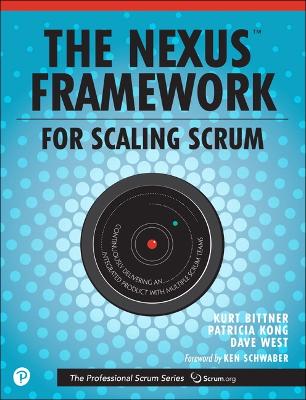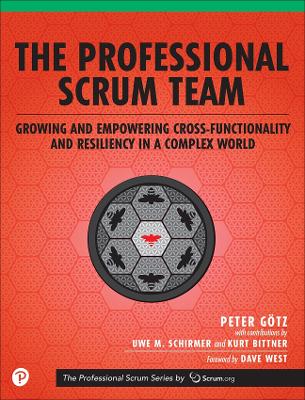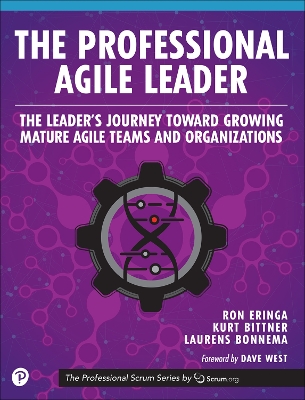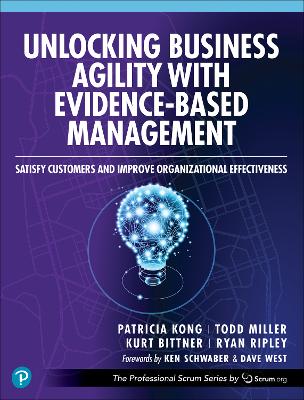The Professional Scrum
4 total works
Nexus Framework for Scaling Scrum, The
by Kurt Bittner, Patricia Kong, and Eric Naiburg
The Nexus Framework is the simplest, most effective approach to applying Scrum at scale across multiple teams, sites, and time zones. Created by Scrum.org–the pioneering Scrum training and certification organization founded by Scrum co-creator Ken Schwaber–Nexus draws on decades of experience to address the unique challenges teams face in coming together, sharing work, and managing and minimizing dependencies.
The Nexus™ Framework for Scaling Scrum is a concise book that shows how Nexus helps teams to deliver a complex, multi-platform, software-based product in short, frequent cycles, without sacrificing consistency or quality, and without adding unnecessary complexity or straying from Scrum’s core principles. Using an extended case study, the authors illustrate how Nexus helps teams solve common scaling challenges like reducing cross-team dependencies, preserving team self-organization and transparency, and ensuring accountability.
- Understand the challenges of delivering working, integrated product increments with multiple teams, and how Nexus addresses them
- Form a Nexus around a new or existing product and learn how that Nexus sets goals and plans its work
- Run Sprints within a Nexus, provide transparency into progress, conduct effective Nexus Sprint reviews, and use Nexus Sprint Retrospectives to continuously improve
- Overcome the distributed team collaboration challenges
“Professional Scrum is hard, not because the ideas are hard, but because it requires persistence, focus, and dedication to not let the day-to-day realities get in the way. In this book, Peter, Uwe, and Kurt have provided a collection of materials to help the Scrum Team deliver value and feel happy doing it.”
--Dave West, CEO and Product Owner, Scrum.org
Teams and individuals find the rules of the Scrum Framework to be easy to describe but challenging to implement. The Professional Scrum Team helps you bring the Scrum Framework rules to life in your everyday work, optimizing both team and individual performance and creating more value.
Three leading Scrum experts bring together proven practices based on decades of real-life experience participating in, leading, and supporting Scrum Teams. They introduce a team as it starts out with Scrum and follow it as it gains hard-won practical experience, gradually mastering the intense collaboration that Scrum demands.
As you share the team's experience--facing and overcoming realistic challenges--you'll discover better ways to work together, enhance your practices, leverage tools, continuously improve, and deliver functionality in ever-shorter cycles.
- Understand how Scrum Teams work, collaborate, and promote transparency
- Explore common problems that lead less experienced Scrum Teams to give up
- Find your Scrum Team's best approach to solving complex adaptive problems
- Integrate DevOps practices with Scrum to improve effectiveness
- Productively and professionally resolve conflicts that arise from close collaboration
- Help your organization learn how to improve its results by better supporting its Scrum Teams
Register your book for convenient access to downloads, updates, and/or corrections as they become available. See inside book for details.
The Professional Agile Leader
by Ron Eringa, Kurt Bittner, and Laurens Bonnema
Hone Your Agile Leadership Skills to Help Your Organization Transform and Thrive
To leverage the immense opportunities associated with accelerating change, organizations need teams capable of trying new ideas quickly, learning from their experiences, and adapting based on that learning. Helping these teams to grow and thrive requires agile leaders who support, inspire, and encourage, and who can leave behind the management skills of directing, monitoring, and rewarding or punishing.
The Professional Agile Leader is a realistic, practical guide, written by experienced agile leaders who share their collective experiences in helping agile leaders to grow responsive and adaptive teams. They structure powerful lessons around a case study based on decades of experience helping agile leaders achieve and sustain agile transformation. Best of all, they never settle for high-level hand-waving--they show you how it's really done.
- Reignite once-successful organizations that have lost their way
- Form cross-functional teams and empower them with purpose
- Learn to let go, as your teams start taking more responsibility
- Overcome forces that want to reel you back into the "old rules"
- Realign the whole organization, since agile and traditional models can't coexist forever
- Achieve the most challenging goal of all: changing culture
Great agile leaders aren't born that way--they're regular people who care deeply about helping others achieve shared goals and have discovered a better way to lead. Whatever your role in the organization, this guide will help you master those skills and mindsets a whole lot faster.
"Drawing on vast experience, Ron, Kurt, and Laurens tease out practical tips and patterns for good leadership [and show] how a leader can help shape the environment for agile teams to succeed. . . . The narrative style of the book makes it easy to read, and I am sure there will be many times that you see yourself in it."
--From the Foreword by Dave West, CEO and Product Owner, Scrum.org
Register your book for convenient access to downloads, updates, and/or corrections as they become available. See inside book for details.
Unlocking Business Agility with Evidence-Based Management
by Patricia Kong, Todd Miller, Kurt Bittner, and Ryan Ripley
Leverage Evidence-Based Management, a scientific method, to enable organizations to achieve goals under conditions of uncertainty.
Organizations often believe in the certainty of their plans and see every deviation from the plan as a sign of failure. They view the organization as a machine for creating and executing plans instead of looking at it as a responsive organism, attentive to the changes in its environment. In a world of uncertainties, organizations need to be capable of reinventing themselves every day based on new information.
In Unlocking Business Agility with Evidence-Based Management, authors Patricia Kong, Todd Miller, Kurt Bittner, and Ryan Ripley use the framework developed by Scrum.org called Evidence-Based Management (EBM). EBM is an empirical approach that helps organizations use experimentation and rapid feedback to progress toward goals. This path is not always obvious or straightforward, but that is a benefit: in a complex and changing world, the path toward goals will always be uncertain. EBM helps organizations use new data to adapt their plan toward their goals.
Throughout the book, the authors present stories and experiences that illustrate how EBM can be applied to set better goals and then leverage empiricism to achieve those goals using feedback, learning, and evidence. This definitive guide will help your organization identify its true purpose, improve its ability to reach goals, and build a culture of trust, transparency, and growth.
- Clarify goals and demonstrate value, success, and progress using agile metrics
- Progress toward goals in uncertain and rapidly changing circumstances
- Embrace empiricism and experimentation to find solutions for complex problems
- Find real-world anonymized case studies on how to articulate goals and measurements in a way that fosters self-management and business agility
Register your book for convenient access to downloads, updates, and/or corrections as they become available. See inside book for details.



